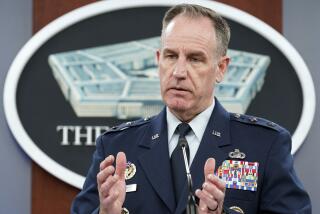U.S. policy in Pakistan faulted
WASHINGTON — The Bush administration has not drafted a comprehensive plan to destroy a resurgent Al Qaeda or other militant groups in the tribal areas of Pakistan and has not adequately monitored the billions in U.S. taxpayer dollars sent to the Pakistani government to combat the groups, according to a sharply critical report by an independent government watchdog agency issued Thursday.
The Government Accountability Office said the administration’s effort has been so ineffective that the U.S. ambassador to Pakistan has resorted to drafting her own plan for the largely lawless rural region because no one in Washington sent one.
Meanwhile, the tribal region, which borders Afghanistan, has become such a haven for Al Qaeda and other Islamic extremist groups that it now poses what may be the greatest terrorist threat to Americans both at home and abroad, the GAO report says, citing recent testimony from top U.S. officials.
A number of private sector and government agencies, including the Sept. 11 commission in 2004, have called for a comprehensive plan for fighting terrorist threats from the tribal areas, according to the nonpartisan GAO, which is the investigative arm of Congress. Such a plan was also mandated by congressional legislation in 2007, and one reason that the National Counterterrorism Center, or NCTC, was created in 2004, the GAO report says.
But the NCTC, the White House’s National Security Council and other executive branch departments have never developed a plan that covers all elements of national power -- diplomatic, military, intelligence, development, economic and law enforcement support, GAO auditors found.
The GAO report also says that $5.8 billion of the $10.5 billion in U.S. aid to Pakistan from 2002 to 2007 was spent on operations in the tribal areas and that 96% of that funding reimbursed Pakistan for military operations that have proved largely unsuccessful.
Other U.S. officials and outside experts have reached similar conclusions regarding what they call lax oversight of American counter-terrorism aid to Pakistan, saying much of it has been used for military hardware better suited for its decades-old conflict with neighbor India than against small and mobile militant forces hiding out in mountain redoubts.
But the GAO report goes further, saying that virtually no steps were taken in Washington to assess how the funds were being spent, even as formal U.S. intelligence assessments warned that Al Qaeda was regrouping.
Pakistan has not allowed American forces to fight militants within its borders, fearing a backlash. So U.S. officials have had to rely on the Pakistani military to carry out operations in the largely autonomous tribal areas.
The GAO report recommends that President Bush’s national security and defense advisors jointly craft a comprehensive plan that would diminish the terrorist threat to Americans at home and abroad.
“Everyone is looking for the perfect answer and end result, and we have not achieved that yet,” said one senior counter-terrorism official, who spoke on condition of anonymity because he is not authorized to comment publicly.
He acknowledged that “disparate efforts, not well coordinated,” were contributing to the lack of effectiveness, but said efforts in Pakistan are nearly impossible given that country’s reluctance to fully cooperate.
“If it could have been solved years ago, it would have been,” the official said.
In formal responses, some senior administration officials agreed with many of the GAO’s assessments but disagreed with some of its broader conclusions, saying, for instance, that various U.S. agencies have their own plans for combating terrorists in the tribal areas.
The State Department, which is charged with coordinating U.S. counter-terrorism efforts with other countries, told auditors that efforts by U.S. officials in Islamabad and Washington do, in fact, constitute a comprehensive strategy.
Gordon Johndroe, a spokesman for the National Security Council, said the United States was countering militants in Pakistan through political, economic and security initiatives.
“We devote resources to health, education, economic development, political reform, as well as going after Al Qaeda with the Pakistani security forces,” Johndroe said. “This is going to be a long battle against a determined enemy.”
Critics, many of them congressional Democrats, used the report’s findings in their continuing criticism of the Bush administration’s counter-terrorism campaign.
Rep. Howard L. Berman (D-Valley Village), chairman of the House Foreign Affairs Committee and one of the lawmakers who first ordered the GAO report, said the lack of planning was “appalling” and harmful to U.S. national security, and that he would hold hearings on them starting May 7.
Berman said the new leadership in Pakistan presents “a new opportunity to overcome the current administration’s failures and to work with the Pakistani people to come up with a plan for victory over the extremist elements.”
--
More to Read
Sign up for Essential California
The most important California stories and recommendations in your inbox every morning.
You may occasionally receive promotional content from the Los Angeles Times.










